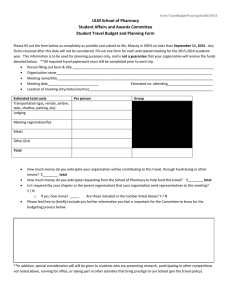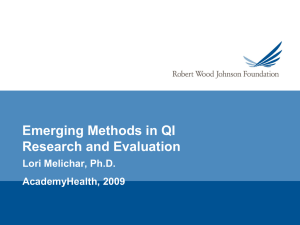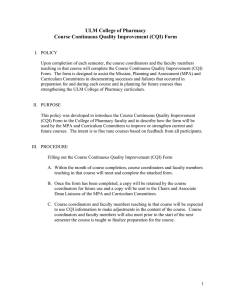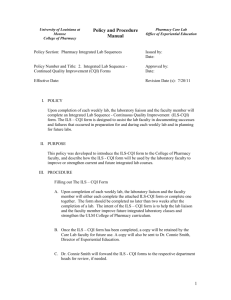Document 12068649
advertisement
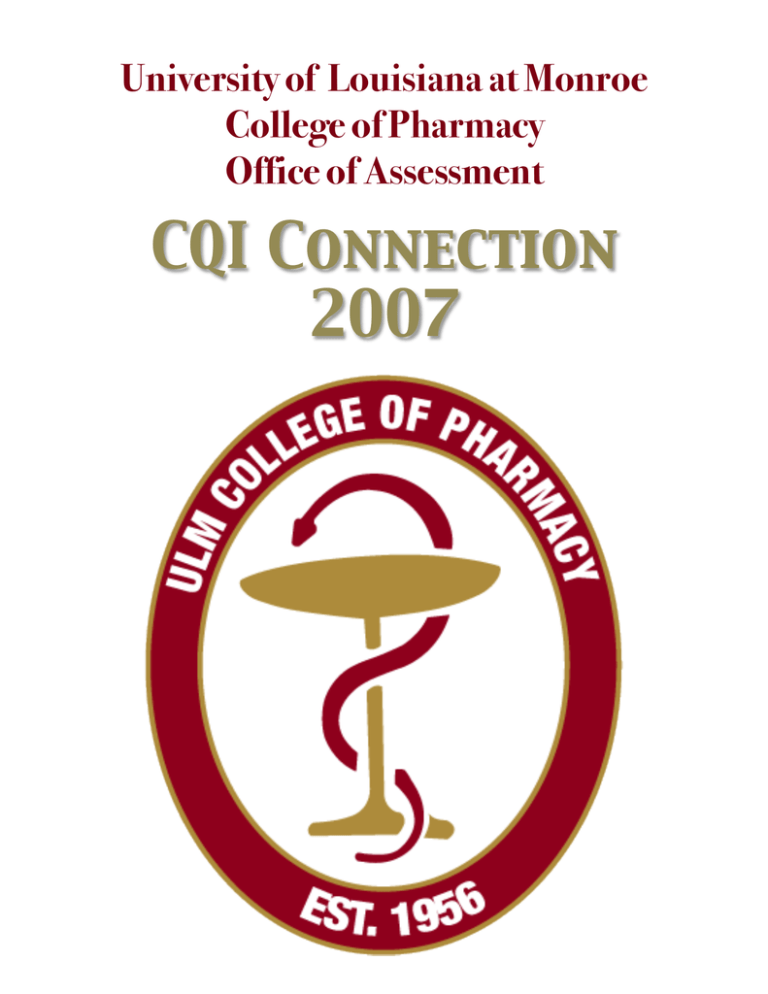
University of Louisiana at Monroe! College of Pharmacy! Office of Assessment! CQI Connection 2007 COP Faculty and Staff: Welcome to The CQI Connection. This is a periodic e-newsletter to update you on assessment activities in the College of Pharmacy. As Dean Pritchard said at our retreat in August, “Assessment is everyone’s responsibility.” Therefore, this newsletter will provide you with information about how everyone is carrying out the mission of continuous quality improvement. • The COP Assessment Plan and Assessment Map are available at COP website http://rxweb.ulm.edu/pharmacy/assessment/default.html . The Mission, Planning, and Assessment Committee chaired by Dr. Gina Biglane is in the process of approving data links to the Assessment Plan. • Strategic plans for College of Pharmacy, Basic Pharmaceutical Sciences, Clinical and Administrative Sciences, Toxicology, and Office of Outcomes Research and Evaluation have been added to the ULM Assessment & Evaluation website https://webservices.ulm.edu/assessment/academic_units.php#pharm . You will need your CWID and password to login. These plans are also available on our COP website. • If you are interested in peer review of teaching in a classroom setting for formative purposes, we have a format and procedure in place. Please consult with your department head as to the appointment of a person from your department to evaluate you. Keep in mind that this person will be evaluating your teaching style, presentation technique, distracting mannerisms, etc. and not necessarily the content of your lecture. This initiative is in place to help you improve your teaching effectiveness. • Mary Caldwell, Assistant Director of Student and Professional Affairs, has asked those who interviewed as part of the admissions process this year to provide her with feedback concerning interviewer training, scheduling, pairing of faculty, questions, dimensions, scoring, or anything else you think is important. Please provide Mary with your ideas for improvement. • After the capstone course PHA574 - Pharmacotherapy Forum was completed for the Spring 2007 semester, some deficits were identified in the area of technical writing skills. Dr. Jeffery Evans, coordinator for the course, and Dr. Greg Leader made a recommendation to Dr. Greg Smith to revise PHA425, Drug Information Retrieval and Evaluation, to proactively address these deficits. As a result, a project was designed with multiple components modeled after the writing assignment in the Forum course. Dr. Smith has also enlisted the help of Dr. Sandra Hill from the English Dept. to lecture on technical writing. Her focus is to help students understand what is considered plagiarism and the proper use and format of referencing. • Dr. Greg Leader has requested that the Office of Assessment and Outcomes Research assist with focus groups of P1, P2, and P3 students to identify areas for improvement in the program (from the student perspective). A follow-up report will be provided to the faculty. If you have information to share concerning your assessment activities, please send it to me. Or, if you have questions about assessment initiatives, please give me a call. Thanks for reading the first edition of The CQI Connection This week’s edition of The CQI Connection focuses on assessment research. • Dr. LaTonya Menefee is conducting a research project to assess cultural competency of P3 students. She has also sent a survey to faculty through createsurvey. Please respond to her survey; your participation will provide a benchmark of where we are related to cultural competency. Results of the surveys will be provided to the Curriculum Committee as they determine where and how to address cultural competency within the new curriculum and to the Faculty Development Committee. • Dr. Yvonne Knox is developing a survey to administer to students concerning the challenges of progressing though the first therapeutics course. Students will be asked about their study behaviors, class preparation, and other factors related to the amount of time they are devoting to this course. Factors for non-progression will be identified and feedback provided to students and professors. • Drs. Scott Baggarly, Ed Adams, Laurel Andrews, Connie Smith, Ann Wicker, and Greg Leader are investigating alcohol use behaviors, attitudes, and knowledge in Doctor of Pharmacy Students. They are doing a pre- and post-intervention study using a web-based alcohol education program “Mystudentbody.com.” Results of this research will be used to determine professional development needs of students and will be linked to KSA’s within the curriculum. • At the August Faculty Retreat, two students, Jennifer Teat and Alex Tewelde shared the results of the COP Student-Faculty Relationships Study conducted under the supervision of Dr. Greg Leader. The following paragraphs are from the study report. “Overall, the faculty members are considerate of students’ schedules, and they want to spend more time with students informally. Every faculty member likes students coming by their office and considers interaction with students to be the most rewarding part of their jobs. Those faculty members not on the main campus wish to increase their contact (face time) with the students. While most faculty prefer personal visits from students, they realize that e-mail can be more practical, but encourage students to adopt a more professional air when composing their e-mails to prevent misunderstandings. The faculty believes that social events involving the faculty and students are important to have because they foster a stronger, more open relationship between the faculty and students.” “In order to improve the current student-faculty relationships, the ULM COP students suggest more activities with students and faculty outside of the classroom, faculty-student mentorship, student-student mentorship, review sessions, mandatory office hours in the pharmacy building for all professors, and announced administrative rule changes.” This CQI Connection spotlights assessment activities of the Office of Experiential Education. Dr. Connie Smith is the Coordinator of Experiential Education and Dr. Laurel Andrews (Rodden) is the Coordinator of Early Experiential Education. Student Assessment • • • • Preceptors complete two student assessments during each practice experience. The midpoint evaluation creates a valuable opportunity to review the experience to date, detect any unexpected issues, and plan for the remainder of the educational experience. The final evaluation reflects the learner’s performance during the entire practice experience— their knowledge, skills, attitudes, and how they have improved during the practice experience. Overall student competencies are evaluated on a scale of 1-below average to 4-superior by their preceptors. Pharmacy Practice Proficiency exams are a required component of Advanced Practice Experiences. These exams are designed to be a tune-up exam for the licensing exam and are scheduled throughout the P4 year. To graduate, a minimum score of 70% must be achieved in three out of four exams. Service learning projects are required for all students each semester. Student learning is assessed through reflective writing assignments. Preceptor Assessment • • • • Practice experience preceptors and sites must meet certain qualifications. All potential preceptors and sites are screened by the OEE to ensure these qualifications are met. Assurance of quality for pharmacy practice sites is currently provided by confidential student evaluations of preceptor and site, site visits/reports, reports from faculty engaged in practice at a particular site, guidance from the district managers in community chains, and guidance from the Louisiana Board of Pharmacy. During site visits, the coordinator assesses experiential teaching at the site, evaluates student projects/activities, identifies problems, reviews policies and procedures, reviews course learning objectives and progress toward meeting those objectives, and other general issues involving the College of Pharmacy. Preceptor self-assessment will be required beginning May 2008. All preceptors will complete this assessment before viewing their student evaluation summary for the previous year. After completing this self-assessment and reviewing past evaluations, they will be able to determine areas of strengths and weakness. A plan for improvement in areas needed will be developed. A free five hour preceptor training program is available online to all active preceptors. Assessment Research Activities • • • • Perceptions of Students, Faculty, and Community Pharmacists regarding Advanced Community Practice Experiences. Evaluation of the student learning in and attitudes toward an early experience in cardiovascular risk factor assessment. Nutrition and Healthy Lifestyle Education in 5th Graders – A Service Learning Project Glucose testing in local pharmacies and businesses – A Service Learning Project ***A follow-up to last week’s CQI Connection concerning assessment research, Drs. Marty Steffenson, Ann Wicker, Mike Racca, Roxie Stewart, and Justin Sherman and graduate assistant Gagan Jain, have their research poster accepted for presentation at ASHP Midyear Meeting. The title is, “Teaching manual blood pressure and radial pulse measurement techniques utilizing a patient simulation mannequin versus traditional human subject double headed stethoscope and double arm palpation methods.” Congratulations! This week the CQI Connection highlights the quality enhancement activities of the Office of Student and Professional Affairs (OSPA) Edwin H. Adams, Pharm.D., CGP, Director Mary L. Caldwell, M.Ed., NCC, LPC, Assistant Director Margie Cannon, Administrative Assistant Lois Dearmon, Admissions Analyst • To enhance communication with students, a video announcement system was installed in the OSPA to provide students with University and College news, events, and special programs. Event pictures and organizational announcements are also displayed. • The OSPA has begun using the Pharmacy College Application Service (PharmCAS), and PharmAdMIT, an admissions software package, to communicate with applicants and to process application data. These programs are provided to members of the American Association of Colleges of Pharmacy (AACP) and streamline the application and admissions process for students. • A system to document student communications via telephone and in-person has been added to standard operating procedures. This paper-based system supplements academic information in student files and may include advising and/or counseling plans, student skills strategies, and referrals to other departments or faculty. • A supplemental admissions webpage will soon be released that allows transfer students to assess compliance with pre-requisite coursework. This spreadsheet view includes all Louisiana institutions of higher education. Out-of-state transfer students are provided with specific instructions on providing information for transfer credit consideration. • SECON, A Drug Screening Company, is being used to manage the random drug screening process. This company ensures that each professional student is randomly screened at least once during each academic year. • A research project utilizing MyStudentBody.com to assess students’ knowledge of alcohol and substance abuse is in progress. A pre-test was administered during P1 orientation. The P1 class completed an online education course and post-test evaluations will be administered. • Vicki Crist, program assessment analyst, has been working with OSPA to design a student records system for advising and for maintaining academic information. Previous years’ Q&A data have been backed-up to a dedicated server. This CQI Connection is an update on the quality enhancement initiatives of the Office of Outcomes Research & Evaluation (OORE), an outreach service arm of the College of Pharmacy that addresses specific needs of the Louisiana patient population. Dr. Sandy Blake is the OORE Director and Melissa Dear is the Director of the Prior Authorization Unit. For more information about the mission and scope of services provided by OORE, please visit http://ulm.edu/pharmacy/oore.html . • To enhance the patient-pharmacist relationship, a motivational interviewing workshop was presented to prior authorization (PA) pharmacists who are certified in asthma education and who participate in Asthma HELP, a telephone-based asthma disease management program for Louisiana Medicaid recipients with a history of above average asthma-related ER utilization. • OORE programming staff is validating outcomes of the Asthma HELP program. Among recipients enrolled for 12 months in the program, preliminary findings indicate: o o o o o 46% decrease in asthma-related ER visits 47% decrease in asthma-related hospitalizations 36% increase in asthma-related pharmacy costs 21% decrease in total asthma-related medical costs, including pharmacy, and $1,026 savings per recipient. • Three Asthma HELP pharmacists will attend an asthma, allergy and immunology meeting in Dallas in November. The meeting provides clinical information as well as training in patient education. • To improve service to DHH, the OORE programming staff is developing an interactive HEDIS database that will allow them to obtain summary HEDIS measures for Medicaid by program and by measurement year. Additionally, a web-based PDF HEDIS report will be available for the 18 HEDIS measures currently reported to DHH. • OORE has formalized the validation processes for all reports/presentations delivered to DHH. A formalized procedure has also been developed for analysis/report requests from DHH to OORE. This CQI Connection spotlights quality enhancement activities of the College of Pharmacy Business Office. This office was established to streamline ordering and account management and to provide realtime information on purchase orders and account balances. The Business Office staff includes: Susan Rogers - Business Manager Bobbi Scallan - Accounts Coordinator Karen Dent - Assistant Accounts Coordinator Kim Doughty - Administrative Assistant • Improvements to the University’s online purchasing system have been made through extensive use of the system by Kim Doughty whose main function is to verify and enter orders. Because of this extensive use of the system, several problem areas have been identified and corrected. • A spreadsheet was developed for each account to provide real-time data for orders placed thus eliminating lag time between updates on CICSPLUS. • Productive relationships have been developed with other offices on campus involved in the purchasing process. These relationships have been instrumental in facilitating processing and tracking of orders. • Karen Dent joined the team this year to assist Susan and Bobbi with maintaining accurate and up-to-date real time data on all accounts. • A COPORDER mailbox was established to ensure that all orders are accessible for processing as they are received and are not dependent on specific staff members’ availability. This also eliminates confusion as to which person to send information. We have a very rich agenda for this Friday’s Faculty meeting so this edition of the CQI Connection will update you on assessment activities. Time on Friday’s agenda will be used to answer questions you may have concerning assessment initiatives covered in this and past editions of the CQI Connection. • Dr. Jeff Cass, Dean of the College of Arts and Sciences and Chair of the Quality Enhancement Plan (QEP) Steering Committee, has developed a power point presentation and requests that faculty who were unable to attend one of his presentations to view it online at http://www.ulm.edu/sacs2009/qep.html. This information will enable you to understand some of the issues surrounding the QEP and decisions regarding its construction and implementation. • Dr. Greg Leader requested that the Office of Assessment and Outcomes Research conduct focus groups of P1, P2, and P3 students to identify areas for improvement in the program (from the student perspective). These focus groups are being held this week and a follow-up report will be provided to faculty. • Mid-term instructor evaluations were conducted for 15 faculty members who taught in the first half of the semester. Course and instructor evaluations for the fall semester began this week. • A survey to measure employers’ perceptions of our students was conducted in conjunction with career fair held October 29th and 30th. The results will be shared in a future edition of the CQI Connection. • Vicki Crist, program assessment analyst for the Office of Assessment and Outcomes Research, has completed the advisement component of the College of Pharmacy student information database. Dr. Edwin Adams and Mrs. Mary Caldwell began using the new electronic form November 1. For this week’s CQI Connection are results of a recent employer survey measuring employers’ perceptions of our student outcome competencies. • How do our graduates rank in providing comprehensive patient specific pharmaceutical care? [38%] Excellent [40%] Very Good [12%] Good [3%] Fair [ ] Poor [7%] Don’t Know • How effectively do our graduates communicate in the healthcare setting? [36%] Excellent [43%] Very Good [14%] Good [2%] Fair [ ] Poor [5%] Don’t Know • How appropriately do our graduates manage and use resources of the health care system? [20%] Excellent [45%] Very Good [25%] Good [3%] Fair [ ] Poor [7%] Don’t Know • How well do our graduates identify, interpret, and evaluate literature needed for the provision of drug information and pharmaceutical care? [25%] Excellent [40%] Very Good [23%] Good [3%] Fair [ ] Poor [9%] Don’t Know • How well do our graduates promote health improvement and self-care? [27%] Excellent [39%] Very Good [27%] Good [2%] Fair [ ] Poor [5%] Don’t Know • How would you rank our graduates’ critical thinking skills? [27%] Excellent [49%] Very Good [15%] Good [5%] Fair [ ] Poor [4%] Don’t Know • How would you rank our graduates related to the manner in which they demonstrate appropriate interpersonal, professional and ethical behaviors? [37%] Excellent [41%] Very Good [17%] Good [2%] Fair [ ] Poor [3%] Don’t Know • Comments. The top three strengths listed were communication skills, clinical knowledge, and professionalism. The top three weaknesses were: management skills, practice experience, and business knowledge. • Closing the loop. Currently, management/administration courses are scheduled in the P1 year long before business knowledge and management skill are put into practice. The Curriculum Committee is developing a new curriculum for implementation in 2009 and is proposing professional practice management classes scheduled in the last half of the P2 year and all of the P3 year as presented at last week’s faculty meeting. This week’s CQI Connection is on instructor and course evaluations. • Student evaluations of courses and instructors are complete and we reached our goal of 100 percent. We are establishing benchmarks so that’s why we chose the paper trail. Thank you for your patience and participation with this process. • Vicki Crist has developed a database to store this data so that we may run reports as needed. A summary report will be provided to each department head and individual faculty will receive reports. • The Curriculum, Assessment, and Faculty Development Committees will also receive summary reports on evaluations to make recommendations for “closing the loop” with quality enhancement initiatives. (These reports will be item specific, not faculty specific.) We have also procured evaluation data from the past two years to add to the database for trend analysis. • Students have the opportunity to provide written comments by leaving them in a designated box in the Office of Assessment and Outcomes Research. They also have the option of e-mailing me at Lawrence@ulm.edu or providing comments via the University online system. • Recently, Dr. Pani announced online course and instructor evaluations. Our students may still participate in this process, and they have the option of entering comments. While this is an important piece of the University assessment process, we chose to continue paper evaluations to achieve a higher response rate. In the past, students have been able to bypass the University system and receive grades without completing evaluations. • Again, thank you for your time and patience with this process. A special thank you to Gagan Jain and Jayesh Parmar, our graduate assistants, for making this process very efficient. This week’s CQI Connection is on LXR*TEST software. This is an assessment tool we are in the process of procuring. If you have used this product, your feedback is appreciated. Here are some of the features of LXR*TEST: • • • • • • • • • Item banking Automatic test construction Mark reader scoring Item analysis Group comparisons LAN testing Web testing Student remediation Scoring and analysis We are also purchasing a scantron reader that works with this software. In the future you may bring your exams to the Office of Assessment and Outcomes Research for scoring. To read more about this product, please visit website http://www.lxr.com/ .
